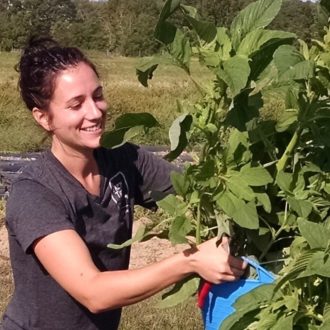Amaranth is a traditional leaf vegetable in over 50 countries, yet little research exists on growing this crop in temperate climates like the Northeast U.S. University of Rhode Island student Sarah Schweig saw the potential that this crop might hold for farmers looking to diversity their farms in our densely populated, ethnically diverse region. Therefore, the goal of her Northeast SARE Graduate Student grant was two-fold: develop production protocols for growing vegetable amaranth under Northeast conditions and study consumer demand for this crop with an eye to varieties of interest to Rhode Island farmers’ market shoppers.
From previous evaluations of 10 vegetable amaranth varieties grown under various conditions, Sarah selected 4 varieties—Miriah, Green Pointed Leaf, Red Callaloo and White Leaf—for both her production and market studies. Her variety trials evaluated yields by planting dates under low tunnels, black plastic mulch and bare soil conditions. Sarah presented her results and tips for growing amaranth in a virtual field day video.
To assess the potential market demand for vegetable amaranth, Sarah conducted a consumer survey at a local farmers’ market where she asked shoppers about their familiarity with amaranth, variety preferences, overall frequency of purchasing fresh vegetables at the market, and individual demographic information. She found that 75% of respondents were familiar with at least one amaranth variety and 69% preferred a variety with which they were already familiar. Although the survey results cannot be generalized, they suggest the importance of identifying and understanding target markets for amaranth.
Sarah reflected on her experience conducting the the project, “The goal of assessing production systems was a beneficial and challenging exercise in identifying the numerous factors involved in decision-making for growers. Through this exercise, I developed a solutions-based understanding of sustainability in which the balance of environmental, social and economic considerations may vary by farm, community, region or season…I think this attitude is necessary for producing responsive, flexible progress in sustainable agriculture and food systems."
